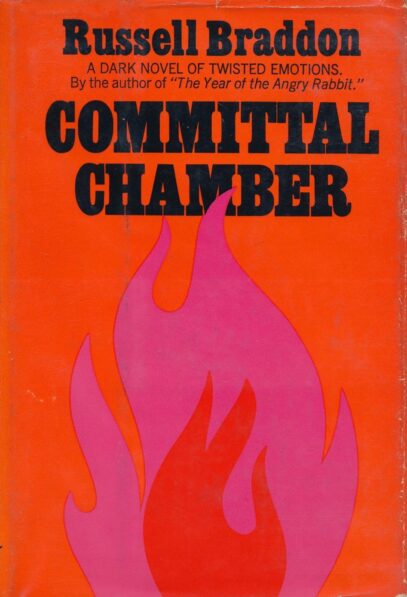 By RUSSELL BRADDON (W.W. Norton; 1966)
By RUSSELL BRADDON (W.W. Norton; 1966)
Ramsey Campbell selected this as the fourth entry in a listing he called “Thirteen Novels on the Edge of Horror.” I’m not entirely sure I agree with that categorization. COMMITTAL CHAMBER from the late Australian novelist, Russell Braddon (1921-95), is certainly macabre, but is it truly a horror novel? I say nay.
The set-up of Braddon’s “Dark Novel of Twisted Emotions” is this: three very different men find themselves working in a claustrophobic committal chamber in a “pseudo-Gothic” UK crematorium. It’s here that, in an extremely well researched, authoritative depiction, coffins containing dead bodies are slid into ovens, and the resulting ashes sifted into urns. As readers of THE CREMATOR by Ladislav Fuks well know, the subject matter is ideally suited to dark-hued psychological fiction, and COMMITTAL CHAMBER seconds that claim. It’s a book that approaches classic status but falls short.
Edwin is an elderly retiree, Ivor a 42 year old ex-sergeant, and Tony a 20 year old virgin. Tony is what nowadays would be termed an incel, although his sexual issues are far more complex than they initially seem. He is in fact a none-too-repressed homosexual, with his desires centered on the well-muscled Ivor. This results in taunts from Tony that grow increasingly hostile, and darken the atmosphere of the committal chamber considerably, with Ivor fighting back and Edwin attempting, without success, to make peace. Things become so toxic that Edwin and Ivor’s marital relationships are affected, and at one point Tony and Ivor get into a heated conversation about murder and how such an act might be pulled off—the details of which prove quite prophetic.
The characterizations of these three men are impeccable, and no wonder: Russell Braddon was, like Ivor, a WWII veteran (and a POW), and, like Tony, experienced an extremely troubled young adulthood (having attempted suicide in 1949). The dialogue the characters spout is likewise impeccable, with each line containing one or more telltale signifiers of the personality behind it. The book is essentially a prose play, being an extremely concentrated drama whose focus is on behavioral nuance. There is, however, action in the final third, and some ingeniously calibrated suspense.
My one complaint, and the element that keeps COMMITTAL CHAMBER from being a true horror novel, is the most unlikely happy ending. Not to give anything away, but the final chapter is a jaw-dropper, attempting to wrap up a bleak and unsettled drama in a trite, moralistic and psychologically unconvincing manner. A pity, as some straightforward horror would have improved matters considerably.
